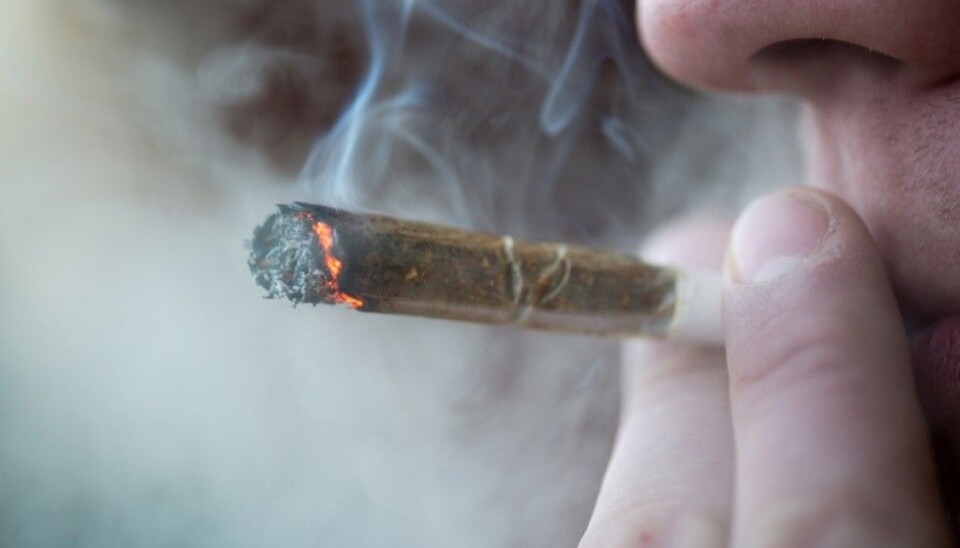
How are elderly hit by early weed use?
Researchers have kept track of 45,000 Swedish males for 40 years.
What special health hazards do cannabis smokers risk when they start reaching old age?
One might assume that as cannabis smoke has much in common with tobacco smoke that users would risk cancer and cardiovascular disease after decades of inhaling marijuana or hashish.
But a Swedish longitudinal cohort study has kept track of how things went with cannabis smokers who were military recruits in Sweden in 1969 and 1970. A total of about 45,000 of these Swedish men have been followed up until 2011.
The researchers tried to find out whether the cannabis smokers ran a higher risk of early death than their age-mates who did not smoke the drug.
“There are hardly any other studies which track so many for such a long time,” says Jørgen Bramness. He is a professor at the University of Oslo’s Norwegian Centre for Addiction Research.
Higher mortality rate
Those who were classified as heavy cannabis users ran a 40 percent greater chance of premature death when compared to their peers who did not smoke the intoxicant.
“Many studies have shown that life is more likely to go wrong for the persons who use a lot of cannabis long-term,” says Bramness.
This tendency has not been seen among persons who only smoked a little cannabis now and then.
“We see the same in other investigations. Light and infrequent cannabis use has no unfortunate consequences.”
Heavy stoners
But what about heavy cannabis use? The study’s point of departure is a questionnaire which the recruits responded to when being conscripted into mandatory military service at the age of 18-19.
They were queried about whether they had ever smoked cannabis, and if so, how often they smoked it. The heavy users reported having smoked hash or pot on more than 50 occasions prior to their induction into the armed forces.
The study was not anonymous, so the researchers had an opportunity to use this information to catch a glimpse of how life has unfolded for those who reported heavy, light or no cannabis use in 1969/1970.
They could also observe how many in these different groups had died by 2011 and use statistical methods to calculate the relative risks of early deaths.
Not cause and effect
“The study does not show whether the use of cannabis caused people in the user group to run a higher mortality risk,” says Bramness.
“For instance, the ones who had smoked it a lot at the age of 18 or 19 could have come from marginalized groups in society. They could also have had unhealthy lifestyles in other ways.”
The new study has its deficiencies. The researchers have attempted to make allowances for other factors impacting life expectancies, such as use of tobacco and alcohol.
But there is much the researchers don’t know about the participants in the project and they emphasize that they have no controls of other factors which could have impacted the men’s health during the decades the follow-up survey was taken.
Nor do the researchers know whether the men continued to use cannabis and how frequently following the start of the study in 1969-70.
“This is not an insignificant drawback in the study and the ideal situation would have been to keep tabs on their cannabis use throughout these years.”
“But if they had used so much there is a greater chance that they continued to use cannabis later in life,” says Bramness.
What did they die of?
The researchers also looked into whether certain causes of death dominated among the heavy users but no greater likelihood of contracting particular diseases was found.
Bramness explains that it is difficult to show clear statistical connections when you look at the causes of death in a little group.
Exactly 867 of the 45,000 were classified as heavy users back in their late teens and 191 of them were dead in 2011. Since 1969, a total of 3,918 of the men in the entire group had died.
“It’s hard to find a clear pattern with such small numbers.”
But the researchers calculated that the men who had been heavy users ran a 40 percent higher chance of a premature death when compared to those who smoked little or no cannabis.
“This is a solid study and the opportunity to follow up an investigation of so many for such a long time is rare,” says Bramness.
Another study based on information from Swedes who were military conscripts confirmed that heavy users of marijuana ran a higher risk of lung cancer than non-smokers did.
Psychoses
The researchers found that persons who suffered from psychoses ran a greater mortality risk than those without the mental diagnosis, completely independent of cannabis use.
“The persons with psychoses who used cannabis ran no additional risk of a premature death.”
“This is a little surprising. And they found no independent cannabis effect among those who smoked it and had psychoses.”
Cannabis use and psychotic episodes are often mentioned together. Other studies have shown that recreational cannabis use could double the risk of teenagers experiencing such episodes.
------------------------------------------------
Read the Norwegian version of this article at forskning.no
Translated by: Glenn Ostling







